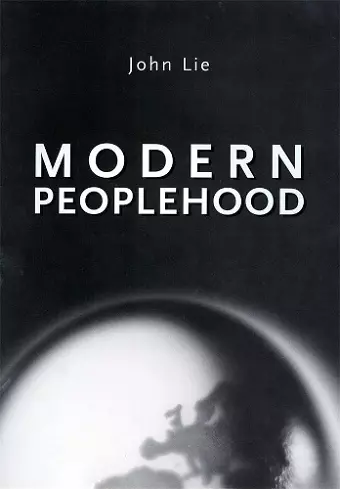Modern Peoplehood
Format:Hardback
Publisher:Harvard University Press
Published:26th Aug '04
Currently unavailable, and unfortunately no date known when it will be back

Lie's objective is to treat a series of large topics that he sees as related but that are usually treated separately: the social construction of identities, the origins and nature of modern nationalism, the explanation of genocide, and racism. These multiple themes are for him aspects of something he calls "modern peoplehood." His mode of demonstration is to review all the alternative explanations for each phenomenon, and to show why each successively is inadequate. His own theses are controversial but he makes a strong case for them. This book should renew debate. -- Immanuel Wallerstein, Yale University and author of The Decline of American Power: The U.S. in a Chaotic World In discussing what are usually termed race, ethnicity, and nationalism, here rendered felicitously by the general term "peoplehood," Lie has produced an original, erudite work that will appeal to sociologists, political scientists, and historians, as well as a wider public interested in race, ethnicity, and nationalism. It is a groundbreaking contribution that will recast our understanding of some of the core issues of our day. -- Kevin Anderson, Purdue University and co-author of Foucault, Gender and the Iranian Revolution: The Seductions of Islamism
Race, ethnicity, and nation, Lie argues, are modern notions, associated with the rise of the modern state, the industrial economy, and Enlightenment ideas. The state is responsible for the development and nurturing of feelings of belonging associated with ethnic, racial, and national identity; but also for racial and ethnic conflict, even genocide.
In modern states, John Lie argues, ideas of race, ethnicity, and nationality can be subsumed under the rubric of "peoplehood." He argues indeed, that the modern state has created the idea of peoplehood. That is, the seemingly primitive, atavistic feelings of belonging associated with ethnic, racial, and national identity are largely formed by the state. Not only is the state responsible for the development and nurturing of these feelings, it is also responsible for racial and ethnic conflict, even genocide. When citizens think of themselves in terms of their peoplehood identity, they will naturally locate the cause of all troubles--from neighborhood squabbles to wars--in racial, ethnic, or national attitudes and conflicts.
Far from being transhistorical and transcultural phenomena, race, ethnicity, and nation, Lie argues, are modern notions--modernity here associated with the rise of the modern state, the industrial economy, and Enlightenment ideas.
Modern Peoplehood is a most impressive achievement by an extraordinarily intelligent, courageous, and—that goes without saying—‘well-read’ mind. The scope of this work is enormous: it provides no less than a comprehensive historically-grounded theory of ‘modern peoplehood,’ which is Lie’s felicitous umbrella term for everything that goes under the names ‘race,’ ‘ethnicity,’ and ‘nationality.’ -- Christian Joppke * American Journal of Sociology *
Lie’s objective is to treat a series of large topics that he sees as related but that are usually treated separately: the social construction of identities, the origins and nature of modern nationalism, the explanation of genocide, and racism. These multiple themes are for him aspects of something he calls ‘modern peoplehood.’ His mode of demonstration is to review all the alternative explanations for each phenomenon, and to show why each successively is inadequate. His own theses are controversial but he makes a strong case for them. This book should renew debate. -- Immanuel Wallerstein, Yale University, author of The Decline of American Power: The U.S. in a Chaotic World
In discussing what are usually termed race, ethnicity, and nationalism, here rendered felicitously by the general term ‘peoplehood,’ Lie has produced an original, erudite work that will appeal to sociologists, political scientists, and historians, as well as a wider public interested in race, ethnicity, and nationalism. It is a groundbreaking contribution that will recast our understanding of some of the core issues of our day. -- Kevin Anderson, Purdue University, coauthor of Foucault and the Iranian Revolution: Gender and the Seductions of Islamism
- Nominated for Best Book Award in Race, Ethnicity, and Politics 2005
- Nominated for Anisfield-Wolf Book Awards 2005
- Nominated for Mary Douglas Prize 2005
- Nominated for Allan Sharlin Memorial Award 2005
ISBN: 9780674013278
Dimensions: unknown
Weight: 699g
394 pages